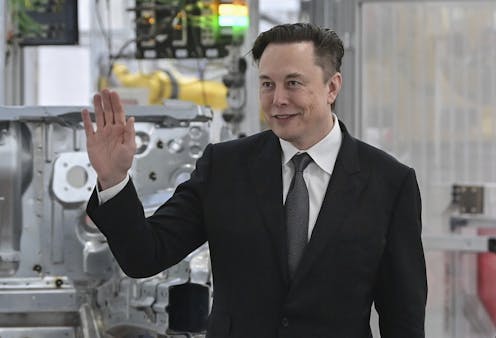Elon Musk argues Twitter would be better off in private rather than public hands – corporate governance scholars would disagree
- Written by Bert Spector, Associate Professor of International Business and Strategy at the D'Amore-McKim School of Business, Northeastern University

Billionaire Elon Musk says he wants to take Twitter private[1] by buying 100% of its publicly held shares in a deal worth US$43 billion.
In a letter to the board, he said that Twitter can’t serve[2] as a platform for free speech as a public company. “Twitter needs to be transformed as a private company,” he wrote.
I’m a scholar in corporate leadership and governance[3]. A big problem with private companies is they lack the safeguards of public corporations – like outside ownership and independent oversight.
Public ownership
Some years ago, I explored the distinction between public and private companies in detail when the American Bar Association invited me to write[4] about what young corporate lawyers need to understand about how business works. Based on that research, I want to point to an important set of distinctions between public and private corporations.
Public corporations are those businesses that trade their stock on a public market, such as the New York Stock Exchange. They are regulated by the Securities and Exchange Commission and are affected by a number of important federal laws, most notably the Corporate Fraud Accountability Act[5], popularly known as Sarbanes-Oxley.
Private companies do not trade their stock publicly. Ownership is tightly held by a limited number of chosen investors. As such, they escape the scrutiny of these public overseers.
Outside oversight
The CEO of a public company is subject to an array of constraints and a varying but always substantial degree of oversight.
There are boards of directors, of course, that review all major strategic decisions. And there are separate committees composed entirely of independent directors who don’t have any ongoing involvement in running the business that assess CEO performance and determine compensation.
In addition, public shareholders are entitled to vote directly on the compensation awarded to top executives. Whole categories of CEO decisions, including mergers and acquisitions, international expansions and changes in the corporation’s charter, are subject to the opinion of shareholders and directors.
The composition of the board of directors is also regulated by law. Half the directors must be independent of the company[6]. And the board committees charged with conducting audits, hiring and firing the CEO and determining executive pay must be 100% independent. Company insiders and close family members may sit on public boards but are not counted as independent.
Full disclosure
The Securities and Exchange Commission requires[7] the CEOs of public corporations to make full and public disclosures of their financial performance. Regular reports require disclosure of operating expenses, significant partnerships, liabilities, strategies, risks and plans.
Additionally, public companies must hire an independent auditing firm approved by the Public Company Accounting Oversight Board[8] to conduct and verify the thoroughness and accuracy of those financial statements. Any fraudulent reporting can result in criminal charges against the CEO and chief financial officer.
These rules are all intended to safeguard the integrity of corporations, to help make them transparent to public investors and to guard against corruption. They are far from perfect[9], but they are helpful. And private corporations are not required to comply with any of them.
Good governance
Well-governed companies, such as Microsoft and PepsiCo[10], tend to outperform[11] poorly governed ones, often dramatically. That’s largely due to all the factors noted above that are required for public companies.
This doesn’t mean all private companies are governed poorly – or that all public businesses are governed well. But key ingredients of good governance, especially accountability, are baked into public corporations in a way that they aren’t for private companies.
[Over 150,000 readers rely on The Conversation’s newsletters to understand the world. Sign up today[12].]
Whether or not Twitter would become a better platform for free speech as a private company is debatable. But management research suggests it would make it perform worse as a business.
This story is an updated version of an article published[13] on July 1, 2021.
References
- ^ wants to take Twitter private (www.cnbc.com)
- ^ Twitter can’t serve (www.sec.gov)
- ^ scholar in corporate leadership and governance (damore-mckim.northeastern.edu)
- ^ invited me to write (www.americanbar.org)
- ^ Corporate Fraud Accountability Act (www.complianceonline.com)
- ^ independent of the company (corporatefinanceinstitute.com)
- ^ Securities and Exchange Commission requires (www.legalandcompliance.com)
- ^ Public Company Accounting Oversight Board (pcaobus.org)
- ^ far from perfect (www.londontfe.com)
- ^ Microsoft and PepsiCo (ethicalboardroom.com)
- ^ tend to outperform (www.nber.org)
- ^ Sign up today (memberservices.theconversation.com)
- ^ article published (theconversation.com)







